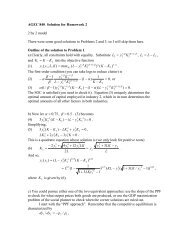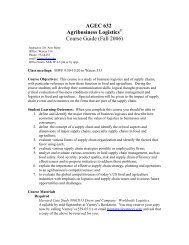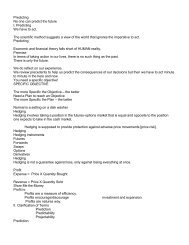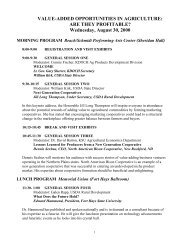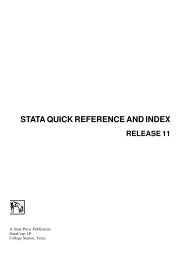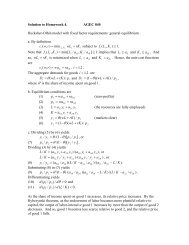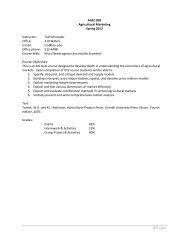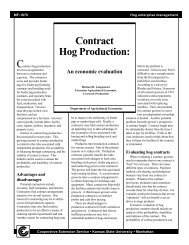- Page 1 and 2: STATA PROGRAMMING REFERENCE MANUAL
- Page 3 and 4: Table of contents intro . . . . . .
- Page 5 and 6: Combined subject table of contents
- Page 7 and 8: [R] db . . . . . . . . . . . . . .
- Page 9 and 10: [P] sortpreserve . . . . . . . . .
- Page 11: Cross-referencing the documentation
- Page 14 and 15: 2 intro — Introduction to program
- Page 16 and 17: 4 intro — Introduction to program
- Page 18 and 19: Title automation — Automation Des
- Page 20 and 21: 8 break — Suppress Break key nobr
- Page 22 and 23: 10 byable — Make programs byable
- Page 24 and 25: 12 byable — Make programs byable
- Page 26 and 27: 14 byable — Make programs byable
- Page 28 and 29: Title Syntax capture — Capture re
- Page 30 and 31: 18 capture — Capture return code
- Page 32 and 33: Title Syntax char — Characteristi
- Page 34 and 35: 22 char — Characteristics Example
- Page 36 and 37: Title class — Class programming D
- Page 38 and 39: 26 class — Class programming vers
- Page 40 and 41: 28 class — Class programming Afte
- Page 42 and 43: 30 class — Class programming vers
- Page 44 and 45: 32 class — Class programming You
- Page 48 and 49: 36 class — Class programming 4.7
- Page 50 and 51: 38 class — Class programming time
- Page 52 and 53: 40 class — Class programming Perh
- Page 54 and 55: 42 class — Class programming In b
- Page 56 and 57: 44 class — Class programming # If
- Page 58 and 59: 46 class — Class programming Buil
- Page 60 and 61: 48 class — Class programming 9. P
- Page 62 and 63: 50 class — Class programming vers
- Page 64 and 65: 52 class — Class programming Pret
- Page 66 and 67: 54 class — Class programming If a
- Page 68 and 69: 56 class — Class programming The
- Page 70 and 71: 58 class — Class programming Buil
- Page 72 and 73: 60 class exit — Exit class-member
- Page 74 and 75: 62 classutil — Class programming
- Page 76 and 77: 64 classutil — Class programming
- Page 78 and 79: Title comments — Add comments to
- Page 80 and 81: Title Syntax confirm — Argument v
- Page 82 and 83: 70 confirm — Argument verificatio
- Page 84 and 85: 72 confirm — Argument verificatio
- Page 86 and 87: 74 continue — Break out of loops
- Page 88 and 89: 76 creturn — Return c-class value
- Page 90 and 91: 78 creturn — Return c-class value
- Page 92 and 93: 80 creturn — Return c-class value
- Page 94 and 95: 82 creturn — Return c-class value
- Page 96 and 97:
84 creturn — Return c-class value
- Page 98 and 99:
Title Syntax datasignature — Dete
- Page 100 and 101:
88 datasignature — Determine whet
- Page 102 and 103:
90 #delimit — Change delimiter #d
- Page 104 and 105:
Title Syntax discard — Drop autom
- Page 106 and 107:
94 display — Display strings and
- Page 108 and 109:
96 display — Display strings and
- Page 110 and 111:
98 display — Display strings and
- Page 112 and 113:
100 display — Display strings and
- Page 114 and 115:
102 display — Display strings and
- Page 116 and 117:
104 ereturn — Post the estimation
- Page 118 and 119:
106 ereturn — Post the estimation
- Page 120 and 121:
108 ereturn — Post the estimation
- Page 122 and 123:
110 ereturn — Post the estimation
- Page 124 and 125:
112 ereturn — Post the estimation
- Page 126 and 127:
114 ereturn — Post the estimation
- Page 128 and 129:
116 ereturn — Post the estimation
- Page 130 and 131:
Title Syntax error — Display gene
- Page 132 and 133:
120 error — Display generic error
- Page 134 and 135:
122 error — Display generic error
- Page 136 and 137:
124 error — Display generic error
- Page 138 and 139:
126 error — Display generic error
- Page 140 and 141:
128 error — Display generic error
- Page 142 and 143:
130 error — Display generic error
- Page 144 and 145:
Title estat programming — Control
- Page 146 and 147:
134 estat programming — Controlli
- Page 148 and 149:
Title Syntax estimates — Manage e
- Page 150 and 151:
138 estimates — Manage estimation
- Page 152 and 153:
Title Syntax exit — Exit from a p
- Page 154 and 155:
142 exit — Exit from a program or
- Page 156 and 157:
144 file — Read and write ASCII t
- Page 158 and 159:
146 file — Read and write ASCII t
- Page 160 and 161:
148 file — Read and write ASCII t
- Page 162 and 163:
150 file — Read and write ASCII t
- Page 164 and 165:
152 file — Read and write ASCII t
- Page 166 and 167:
154 file — Read and write ASCII t
- Page 168 and 169:
156 file — Read and write ASCII t
- Page 170 and 171:
158 file — Read and write ASCII t
- Page 172 and 173:
160 file — Read and write ASCII t
- Page 174 and 175:
Title Syntax findfile — Find file
- Page 176 and 177:
Title Syntax foreach — Loop over
- Page 178 and 179:
166 foreach — Loop over items The
- Page 180 and 181:
168 foreach — Loop over items Exa
- Page 182 and 183:
170 foreach — Loop over items If
- Page 184 and 185:
Title Syntax forvalues — Loop ove
- Page 186 and 187:
174 forvalues — Loop over consecu
- Page 188 and 189:
Title Syntax fvexpand — Expand fa
- Page 190 and 191:
178 gettoken — Low-level parsing
- Page 192 and 193:
180 gettoken — Low-level parsing
- Page 194 and 195:
182 if — if programming command E
- Page 196 and 197:
Title Syntax include — Include co
- Page 198 and 199:
186 include — Include commands fr
- Page 200 and 201:
188 levelsof — Levels of variable
- Page 202 and 203:
Title Syntax macro — Macro defini
- Page 204 and 205:
192 macro — Macro definition and
- Page 206 and 207:
194 macro — Macro definition and
- Page 208 and 209:
196 macro — Macro definition and
- Page 210 and 211:
198 macro — Macro definition and
- Page 212 and 213:
200 macro — Macro definition and
- Page 214 and 215:
202 macro — Macro definition and
- Page 216 and 217:
204 macro — Macro definition and
- Page 218 and 219:
206 macro — Macro definition and
- Page 220 and 221:
208 macro — Macro definition and
- Page 222 and 223:
Title Syntax macro lists — Manipu
- Page 224 and 225:
212 macro lists — Manipulate list
- Page 226 and 227:
Title Syntax makecns — Constraine
- Page 228 and 229:
216 makecns — Constrained estimat
- Page 230 and 231:
218 makecns — Constrained estimat
- Page 232 and 233:
Title Syntax mark — Mark observat
- Page 234 and 235:
222 mark — Mark observations for
- Page 236 and 237:
224 mark — Mark observations for
- Page 238 and 239:
Title Syntax matlist — Display a
- Page 240 and 241:
228 matlist — Display a matrix an
- Page 242 and 243:
230 matlist — Display a matrix an
- Page 244 and 245:
232 matlist — Display a matrix an
- Page 246 and 247:
234 matlist — Display a matrix an
- Page 248 and 249:
236 matlist — Display a matrix an
- Page 250 and 251:
Title matrix — Introduction to ma
- Page 252 and 253:
240 matrix — Introduction to matr
- Page 254 and 255:
Title Syntax matrix accum — Form
- Page 256 and 257:
244 matrix accum — Form cross-pro
- Page 258 and 259:
246 matrix accum — Form cross-pro
- Page 260 and 261:
248 matrix accum — Form cross-pro
- Page 262 and 263:
250 matrix accum — Form cross-pro
- Page 264 and 265:
252 matrix define — Matrix defini
- Page 266 and 267:
254 matrix define — Matrix defini
- Page 268 and 269:
256 matrix define — Matrix defini
- Page 270 and 271:
258 matrix define — Matrix defini
- Page 272 and 273:
260 matrix define — Matrix defini
- Page 274 and 275:
262 matrix define — Matrix defini
- Page 276 and 277:
264 matrix define — Matrix defini
- Page 278 and 279:
266 matrix define — Matrix defini
- Page 280 and 281:
268 matrix define — Matrix defini
- Page 282 and 283:
270 matrix dissimilarity — Comput
- Page 284 and 285:
272 matrix dissimilarity — Comput
- Page 286 and 287:
Title Syntax Menu matrix eigenvalue
- Page 288 and 289:
276 matrix eigenvalues — Eigenval
- Page 290 and 291:
278 matrix get — Access system ma
- Page 292 and 293:
Title Syntax Menu matrix mkmat —
- Page 294 and 295:
282 matrix mkmat — Convert variab
- Page 296 and 297:
284 matrix mkmat — Convert variab
- Page 298 and 299:
Title Syntax matrix rownames — Na
- Page 300 and 301:
288 matrix rownames — Name rows a
- Page 302 and 303:
290 matrix rownames — Name rows a
- Page 304 and 305:
292 matrix score — Score data fro
- Page 306 and 307:
Title Syntax Menu matrix svd — Si
- Page 308 and 309:
296 matrix svd — Singular value d
- Page 310 and 311:
298 matrix symeigen — Eigenvalues
- Page 312 and 313:
Title Syntax Menu matrix utility
- Page 314 and 315:
302 matrix utility — List, rename
- Page 316 and 317:
Title Syntax nopreserve option —
- Page 318 and 319:
306 numlist — Parse numeric lists
- Page 320 and 321:
Title Syntax pause — Program debu
- Page 322 and 323:
310 pause — Program debugging com
- Page 324 and 325:
Title Syntax postfile — Save resu
- Page 326 and 327:
314 postfile — Save results in St
- Page 328 and 329:
Title Syntax predict — Obtain pre
- Page 330 and 331:
Title Syntax preserve — Preserve
- Page 332 and 333:
320 preserve — Preserve and resto
- Page 334 and 335:
322 program — Define and manipula
- Page 336 and 337:
324 program — Define and manipula
- Page 338 and 339:
326 program properties — Properti
- Page 340 and 341:
328 program properties — Properti
- Page 342 and 343:
Title Syntax quietly — Quietly an
- Page 344 and 345:
332 quietly — Quietly and noisily
- Page 346 and 347:
Title Syntax return — Preserve sa
- Page 348 and 349:
336 return — Preserve saved resul
- Page 350 and 351:
338 return — Return saved results
- Page 352 and 353:
340 return — Return saved results
- Page 354 and 355:
342 return — Return saved results
- Page 356 and 357:
344 return — Return saved results
- Page 358 and 359:
346 rmcoll — Remove collinear var
- Page 360 and 361:
348 rmcoll — Remove collinear var
- Page 362 and 363:
Title Syntax robust — Robust vari
- Page 364 and 365:
352 robust — Robust variance esti
- Page 366 and 367:
354 robust — Robust variance esti
- Page 368 and 369:
356 robust — Robust variance esti
- Page 370 and 371:
358 robust — Robust variance esti
- Page 372 and 373:
360 robust — Robust variance esti
- Page 374 and 375:
362 robust — Robust variance esti
- Page 376 and 377:
364 robust — Robust variance esti
- Page 378 and 379:
366 robust — Robust variance esti
- Page 380 and 381:
368 robust — Robust variance esti
- Page 382 and 383:
370 robust — Robust variance esti
- Page 384 and 385:
372 robust — Robust variance esti
- Page 386 and 387:
Title Syntax scalar — Scalar vari
- Page 388 and 389:
376 scalar — Scalar variables Now
- Page 390 and 391:
378 scalar — Scalar variables The
- Page 392 and 393:
380 scalar — Scalar variables A b
- Page 394 and 395:
382 serset — Create and manipulat
- Page 396 and 397:
384 serset — Create and manipulat
- Page 398 and 399:
386 serset — Create and manipulat
- Page 400 and 401:
388 serset — Create and manipulat
- Page 402 and 403:
390 signestimationsample — Determ
- Page 404 and 405:
Title Syntax sleep — Pause for a
- Page 406 and 407:
394 smcl — Stata Markup and Contr
- Page 408 and 409:
396 smcl — Stata Markup and Contr
- Page 410 and 411:
398 smcl — Stata Markup and Contr
- Page 412 and 413:
400 smcl — Stata Markup and Contr
- Page 414 and 415:
402 smcl — Stata Markup and Contr
- Page 416 and 417:
404 smcl — Stata Markup and Contr
- Page 418 and 419:
406 smcl — Stata Markup and Contr
- Page 420 and 421:
408 smcl — Stata Markup and Contr
- Page 422 and 423:
410 smcl — Stata Markup and Contr
- Page 424 and 425:
412 smcl — Stata Markup and Contr
- Page 426 and 427:
414 smcl — Stata Markup and Contr
- Page 428 and 429:
416 smcl — Stata Markup and Contr
- Page 430 and 431:
418 sortpreserve — Sort within pr
- Page 432 and 433:
Title Syntax syntax — Parse Stata
- Page 434 and 435:
422 syntax — Parse Stata syntax d
- Page 436 and 437:
424 syntax — Parse Stata syntax d
- Page 438 and 439:
426 syntax — Parse Stata syntax o
- Page 440 and 441:
428 syntax — Parse Stata syntax o
- Page 442 and 443:
430 syntax — Parse Stata syntax T
- Page 444 and 445:
432 syntax — Parse Stata syntax Y
- Page 446 and 447:
434 syntax — Parse Stata syntax F
- Page 448 and 449:
Title Syntax sysdir — Query and s
- Page 450 and 451:
438 sysdir — Query and set system
- Page 452 and 453:
440 sysdir — Query and set system
- Page 454 and 455:
442 tabdisp — Display tables by(s
- Page 456 and 457:
444 tabdisp — Display tables . us
- Page 458 and 459:
446 tabdisp — Display tables . co
- Page 460 and 461:
448 tabdisp — Display tables . us
- Page 462 and 463:
450 timer — Time sections of code
- Page 464 and 465:
452 tokenize — Divide strings int
- Page 466 and 467:
454 trace — Debug Stata programs
- Page 468 and 469:
456 trace — Debug Stata programs
- Page 470 and 471:
458 trace — Debug Stata programs
- Page 472 and 473:
460 unab — Unabbreviate variable
- Page 474 and 475:
Title Syntax unabcmd — Unabbrevia
- Page 476 and 477:
Title Syntax version — Version co
- Page 478 and 479:
Title Syntax viewsource — View so
- Page 480 and 481:
468 while — Looping program demo
- Page 482 and 483:
Title Syntax window programming —
- Page 484 and 485:
472 Subject and author index c(file
- Page 486 and 487:
474 Subject and author index covari
- Page 488 and 489:
476 Subject and author index Greene
- Page 490 and 491:
478 Subject and author index member
- Page 492 and 493:
480 Subject and author index s-clas
- Page 494:
482 Subject and author index Window


![[P] Programming](https://img.yumpu.com/13808921/47/500x640/p-programming.jpg)
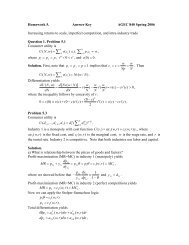
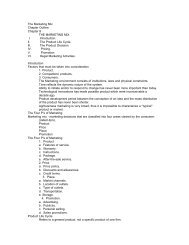
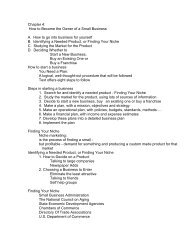
![[U] User's Guide](https://img.yumpu.com/43415728/1/178x260/u-users-guide.jpg?quality=85)
